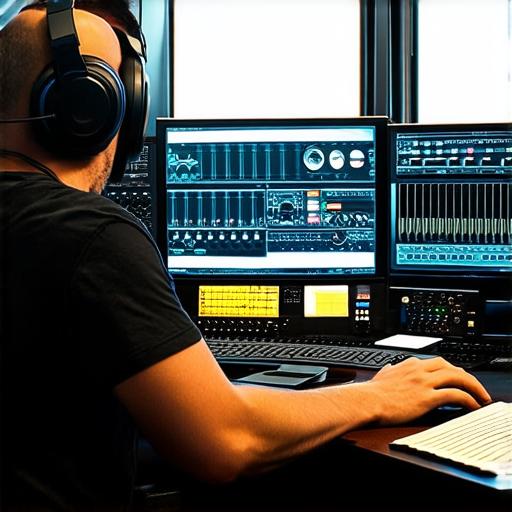Introduction
Video games are no longer just for children and teenagers. They have become an integral part of our daily lives, with millions of people worldwide playing them on various platforms such as PCs, consoles, and mobile devices.
As the demand for high-quality video games continues to grow, so does the need for skilled audio engineers who can create immersive and engaging soundscapes that enhance the overall gaming experience. In this article, we will explore how to become a video game audio engineer, including the necessary education, skills, and experience required to succeed in this exciting and rapidly evolving field.
Education and Skills
The first step towards becoming a video game audio engineer is to acquire the necessary education and skills. While there is no specific degree or diploma program that guarantees success in this field, many colleges and universities offer programs in audio engineering, game design, and interactive entertainment that provide a strong foundation in the subject matter.
Audio engineering programs typically cover topics such as sound synthesis, signal processing, acoustics, and recording techniques. These skills are essential for creating realistic and convincing sound effects, music, and dialogue that bring video games to life. Game design programs, on the other hand, focus on the creative aspects of game development, including narrative, level design, and user experience. A strong understanding of both disciplines is crucial for a successful career in video game audio engineering.

In addition to formal education, there are many online courses and tutorials that can help you acquire the necessary skills and knowledge. Websites such as Coursera, Udemy, and Skillshare offer a wide range of courses on audio engineering, game design, and programming that can be completed at your own pace.
Experience
While formal education is essential for acquiring the necessary knowledge and skills, practical experience is equally important for becoming a successful video game audio engineer. Many aspiring audio engineers start by working as interns or entry-level positions in game development studios, where they can gain hands-on experience in creating soundscapes, recording voiceovers, and implementing audio into games.
Internships are particularly valuable for gaining experience and building a network of contacts in the industry. Many game development studios offer unpaid internships, but these can often lead to paid positions if you demonstrate your skills and dedication.
Software and Tools
As a video game audio engineer, you will need to be proficient in using various software and tools to create and implement sound into games. Some of the most popular software used in this field include:
- Pro Tools: A professional-grade audio editing and recording software that is widely used in the gaming industry.
- Wwise: A middleware platform that allows you to create, edit, and implement audio into games.
- FMOD: Another middleware platform that offers similar functionality to Wise.
- Unity: A popular game engine that includes built-in audio tools for creating and implementing sound in games.
In addition to these software tools, you will also need a high-quality microphone, headphones, and a computer with sufficient processing power to run the software effectively.
Case Studies and Personal Experience
One of the best ways to learn about becoming a video game audio engineer is by reading case studies and personal experiences from professionals in the field. These stories can provide valuable insights into the day-to-day work of an audio engineer, as well as the skills and knowledge required to succeed in this competitive industry.
Conclusion
Becoming a video game audio engineer is a challenging and rewarding career path for those who have a passion for creating immersive and engaging soundscapes that enhance the overall gaming experience. To succeed in this field, you will need to acquire the necessary education and skills, gain practical experience through internships or entry-level positions, and become proficient in using various software and tools.
By following these steps and reading case studies and personal experiences from professionals in the field, you can gain valuable insights into the day-to-day work of a video game audio engineer and develop the skills and knowledge needed to succeed in this exciting and rapidly evolving industry.



